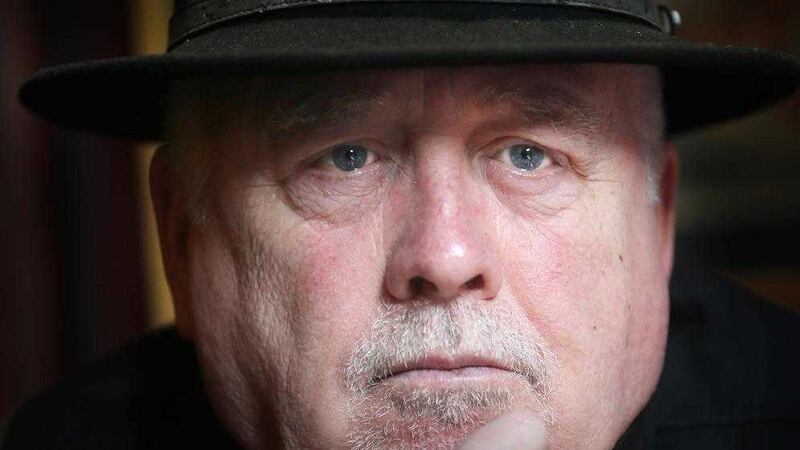When we see Sinn Féin’s long-time spin master Danny Morrison moving into the public spotlight it’s a sure sign there’s a strong stink in the air that needs urgent attention to keep the Sinn Féin version of things intact (February 3).
To give added credibility to his version it was unfortunate that he chose to resort to the standard Sinn Féin tactic of treating those without blemish as less than honest. In this instance Frankie Mulhern has a shadow cast over him.
It is also noteworthy Morrison offered little sympathy to Frankie’s distress. Why would Frankie Mulhern want to tell lies about his dead son?
When he becomes successful in his fight for truth and justice for his son then those gruesome details may have to be told. It’s worth remembering Scappaticci didn’t promote himself.
Why has Danny Morrison never given us any plausible explanations as to why Tony Blair’s spin master Jonathan Powell wrote Gerry Adams’s speeches in the run up to and during the GFA negotiations?
Whose was the war and whose was the peace?
It was indeed a dirty war and a dirty peace and remains so with the race now on with the major scoundrels trying to further conceal or unload their dirt to try to smell like roses and with countless graves of restless souls all around us therein lies a problem that’s likely to haunt us for a very long time.
History has a knack of rebelling against being rewritten, especially with the dead crying to us from beyond the grave. What a shame and what a mess.
LAURENCE O'NEILL
Martinstown, Co Antrim
Justice minister still has it within his gift to cancel his cuts
Readers should note the recent government U-turn over proposed legal aid cuts in England and Wales. As well as controversial contract-tendering, the Tory government had proposed an 8.75 per cent cut to legal aid.
The justice secretary acknowledged that “many barristers feared that the commercial model being designed by some solicitors’ firms would lead to a diminution in choice and potentially quality. By not pressing ahead with dual contracting, and suspending the fee cut, at this stage we will…make it easier in all circumstances for litigators to instruct the best advocates, enhancing the quality of representation in our courts”.
The chair of the Bar Council of England and Wales said that the decision “shows that the Lord Chancellor has listened to the legal profession’s concerns about access to justice”.
A solicitor representing many of the firms taking court action against the changes commented accurately that “reform can happen, but only if it is collaborative rather than imposed.”
The government’s change of heart followed expensive legal challenges, academic, media and judicial criticism and growing evidence of declining advocacy standards.
Mr Gove’s desire to have the best advocates instructed in court and to enhance the quality of victims’ and defendants’ representation contrasts starkly with Justice Minister David Ford’s stated aim for a basic human rights compliant justice system.
Not a ‘quality’, ‘excellent’, or even ‘good’ system. A basic one.
With the 8.75 per cent cut in England and Wales described as “swingeing”, it is understandable that lawyers (as well as victims and defendants) here fear for the quality of representation in our criminal courts if these cuts (some 50 per cent to 66 per cent since 2005) are implemented.
The stakes are high – if any of your readers or their family members are unfortunate enough to either be accused of a serious crime or are the victim of a serious crime, they need quality lawyers to properly represent their interests.
Will the minister now recognise the importance of quality advocacy in the criminal courts? Will he acknowledge the need for a collaborative resolution, rather than an
imposed one?
David Ford still has it within his gift to make a decision similar to that of his British counterpart and cancel his cuts. A decision to protect quality advocacy in the criminal courts. A decision to put victims and defendants front and centre, rather than continuing an idealogical assault on lawyers.
In short, the minister can not only make a brave decision, he can make the right decision.
DECLAN P QUINN BL
Belfast BT1
Newly embraced policies a step too far for many Catholic voters
May I lend my voice in support of views expressed by readers recently with regard to the forthcoming election.
A sad situation has arisen. I wish it were not so but it is impossible for traditional Catholics to support the nationalist parties which hitherto attracted their votes. That’s to say, to vote for a party which would approve of legislation to terminate a baby’s life in the womb simply because of disability or circumstances of conception would go against deeply held Christian principles. I believe that all life is precious and the protection of the most vulnerable must continue to be enshrined in the law. However difficult the circumstances may be for the expectant mother, deliberate intervention to end the life of the unborn child should never be seen as a solution.
(Exceptions already exist where the mother’s life is in danger). How could any God-fearing Catholic vote for a party which endorses such a view and would change our current laws which are pro-life.
The second issue is the farce of legalising ‘same-sex marriage’ which is in violation of God’s natural law which affirms marriage between a man and a woman – for procreation of children, the well-being of the family and the good of society. Redefinition of marriage has been accepted by both SDLP and Sinn Féin with little regard for traditional Catholic values. Are Catholics expected to push aside their core beliefs when going to the polls?
While I am aware that no single party will meet our individual expectations, there hasn’t until recently been any problem for nationalists casting their votes, predictably for representatives of either of the two main nationalist parties; decisions were often based on the nationalist candidate mostly likely to gain majority or oust unionist candidate. Overall, voting was uncomplicated; candidates, broadly speaking, reflected the aspirations of the Catholic people.
All has changed to the point that many Catholics are uncomfortable with the newly embraced policies of both nationalist parties. It is a step too far for many voters.
NOREEN MAGUIRE
Enniskillen, Co Fermanagh
Stooping to new low in attack on SF
In their letters (January 29 and February 3) Liam Gibson and Catherine Sewell appear to be confused regarding Sinn Féin’s stance on abortion.
Liam suggests that because the party supported the right of the Marie Stopes clinic to open in Belfast that somehow that was support for abortion. He then listed a load of statements and contradictions regarding the party’s policy on this subject but the fact remains that even though SF is a broad church and like all other parties its members have many opinions on abortion the only one that matters is the party’s policy agreed at the Ard Fheis.
SF are opposed to abortion on demand and only support the woman’s right to choose in the case of fatal foetal abnormalities (FFA), incest and rape.
Catherine needs to understand that FFA means that doctors have diagnosed that the unborn child has no chance of survival outside the mother’s womb so then and only then would the mother be given the choice of a termination. The disturbing part of her letter was regarding children born with a disability. For her to suggest the party would support aborting such children is disgusting and stooping to a new low to attack the party. To lower the debate on abortion to this level with untruths and scaremongering does a great injustice to all those involved.
ALLISTER MATTHEWS
Glengormley, Co Antrim








